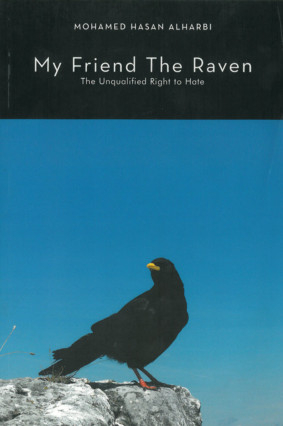
My Friend The Raven: The Unqualified Right to Hate
By Mohamed Hasan Alharbi, XLIBRIS, 48 pages, $21.39
Open here I flung the shutter, when, with many a flirt and flutter,
In there stepped a stately Raven of the saintly days of yore;
Not the least obeisance made he; not a minute stopped or stayed he;
But, with mien of lord or lady, perched above my chamber door —
Perched upon a bust of Pallas just above my chamber door —
Perched, and sat, and nothing more
— ‘The Raven’ by Edgar Allan Poe
Mohammad Hasan Al Harbi’s book deals only with one topic: the raven which, according to the author, is “the most hated bird in the Orient”. The “primary sign of doom” in the Arab world. Why write about it, then? The attempt here is to try and rehabilitate a creature that has been a victim of baseless, blind hate.
The author takes the argument forward, and contends that the idea of the hatred of the raven can be extended to humans who are subjected to hatred for no apparent reason. He equates “hate” with “extremism”.
“The concept of hate, on the other hand, involves a sequence of tragic events which may surpass the physical and psychological capability to cope, possibly leading even to annihilation. In my opinion, there is no difference between killing a non-edible bird and an unwanted man. Both cases reveal alienation or even neutralisation, a principle stemming from a malignant idea based on hate fed by high toxicity.”
The writer argues that the bird might, in reality, be beneficial to mankind, the environment and to other birds. So is it right to hate something that is beneficial? He believes the inherited culture in the East does not allow people to question what they see as received wisdom. This, he reckons, is a tragic and complex issue.
Even in pre-Islamic times in the Arab region, it was believed that the raven is a harbinger of bad luck. Whenever someone heard a raven, he would pray that nothing bad happens. In fact, some say that one should be worried if a raven caws once, but be optimistic if it caws twice! Some others believe that two caws are a sign of impending evil, while three caws are a sign of something good waiting to happen.
Arabs derived many words from the Arabic name for the bird (ghorab). Not surprisingly, these words have negative connotations. The Arabic word for “alienation” is ghorbah and the word for “strange” is ghareeb. To describe fertile lands, early Arabs would say “it is an area where a raven would not fly”. The Arabic poet Hassan Bin Thabet mentions the bird in his work thus: “Their alienation was echoed by a raven’s caw at the evening hour when it landed on the branch of a willow and started chanting.”
Arabs also hate it for what it allegedly does to a camel. They believed whenever a raven spots an ulcer or a wound on the back of a camel, it jabs at it with its beak until the camel dies.
However, the author ends with the conclusion that the more one’s heart is full of love, the more optimistic he becomes.









